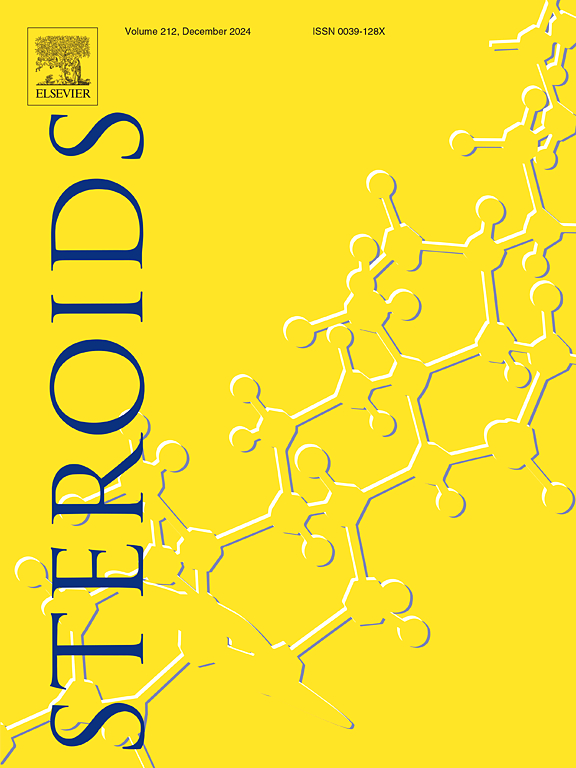Acetate abates adipose-ovarian endocrinometabolic disturbance in experimentally induced polycystic ovarian syndrome
IF 2.1
4区 医学
Q4 BIOCHEMISTRY & MOLECULAR BIOLOGY
引用次数: 0
Abstract
Background
Besides ovarian dysfunction and infertility, individuals with polycystic ovarian syndrome (PCOS) also present a number of systemic disturbances including functional derangements in the adipose tissue which possibly aggravates the endocrinometabolic abnormality in PCOS. Epigenetic changes have been implicated in metabolic-related disorders including PCOS. However, its pathogenic involvement in adipose-ovarian dysfunction is unclear. Therefore, the present research was designed to investigate the impact of epigenetic regulator, particularly short chain fatty acids (SCFAs) on adipose-ovarian dysfunction in PCOS rat model.
Materials and Methods
Eight-weeks-old female Wistar rats were allotted into four groups of n = 5, namely control, sodium acetate (SACT), letrozole (LETZ), and LETZ + SACT. Letrozole (1 mg/kg; p.o.) was administered daily for 21 days to induce PCOS. Thereafter, the animals were treated daily with SACT (200 mg/kg; p.o.) for 6 weeks.
Results
Letrozole-induced PCOS rats were presented with androgen excess, insulin resistance/hyperinsulinemia, ovarian cystic follicles, increased levels of anti-Mullerian hormone, leptin, with a corresponding decrease in 17-β estradiol, and adiponectin. In addition, the LETZ group also showed dyslipidemia, decreased levels of adipose/ovarian sirtuin-1, adipose triglyceride, increased lipase activity as well as ovarian triglyceride, with corresponding increase in adipose/ovarian lipid peroxidation, caspase-6, TGF-β1, inflammatory response (TNF-α, NF-κB and MIF) and decreased GSH. Adipose/ovarian mitofusin 2 depletion was observed in LETZ group and this was accompanied by elevated HDAC2. Nevertheless, administration of acetate reversed these perturbations.
Conclusion
Overall, the present results suggest that acetate ameliorates adipose-ovarian metabolic and endocrine disruptions that accompany PCOS, and these beneficial effects of acetate are associated with reduction of HDAC2 levels and elevation of mitofusin 2/sirtuin-1.

醋酸酯减轻实验性多囊卵巢综合征中脂肪-卵巢内分泌代谢紊乱。
背景:除了卵巢功能障碍和不孕不育,多囊卵巢综合征(PCOS)患者还会出现一些全身性紊乱,包括脂肪组织功能紊乱,这可能会加剧PCOS患者的内分泌代谢异常。表观遗传变化涉及代谢相关疾病,包括多囊卵巢综合征。然而,其与脂肪-卵巢功能障碍的致病关系尚不清楚。因此,本研究旨在探讨表观遗传调节剂,特别是短链脂肪酸(SCFAs)对PCOS大鼠脂肪-卵巢功能障碍的影响。材料与方法:将8周龄雌性Wistar大鼠分为对照、醋酸钠(SACT)、来曲唑(LETZ)和来曲唑+ SACT四组,每组n = 5。来曲唑(1mg /kg;连续21天每天给药,诱导PCOS。此后,每天给动物注射SACT (200 mg/kg;p.o.)六个星期。结果:来曲唑诱导的PCOS大鼠雄激素过量,胰岛素抵抗/高胰岛素血症,卵巢囊泡,抗苗勒管激素、瘦素水平升高,17-β雌二醇和脂联素相应降低。此外,LETZ组还出现血脂异常,脂肪/卵巢sirtuin-1、脂肪甘油三酯水平降低,脂肪酶活性和卵巢甘油三酯水平升高,脂肪/卵巢脂质过氧化、caspase-6、TGF-β1、炎症反应(TNF-α、NF-κB和MIF)相应升高,GSH降低。LETZ组观察到脂肪/卵巢有丝分裂酶2缺失,并伴有HDAC2升高。然而,醋酸酯的施用逆转了这些扰动。结论:总的来说,目前的研究结果表明,醋酸盐可以改善PCOS患者的脂肪-卵巢代谢和内分泌紊乱,这些有益作用与降低HDAC2水平和升高mitofusin 2/sirtuin-1有关。
本文章由计算机程序翻译,如有差异,请以英文原文为准。
求助全文
约1分钟内获得全文
求助全文
来源期刊

Steroids
医学-内分泌学与代谢
CiteScore
5.10
自引率
3.70%
发文量
120
审稿时长
73 days
期刊介绍:
STEROIDS is an international research journal devoted to studies on all chemical and biological aspects of steroidal moieties. The journal focuses on both experimental and theoretical studies on the biology, chemistry, biosynthesis, metabolism, molecular biology, physiology and pharmacology of steroids and other molecules that target or regulate steroid receptors. Manuscripts presenting clinical research related to steroids, steroid drug development, comparative endocrinology of steroid hormones, investigations on the mechanism of steroid action and steroid chemistry are all appropriate for submission for peer review. STEROIDS publishes both original research and timely reviews. For details concerning the preparation of manuscripts see Instructions to Authors, which is published in each issue of the journal.
 求助内容:
求助内容: 应助结果提醒方式:
应助结果提醒方式:


